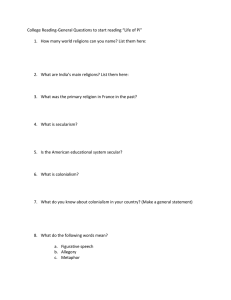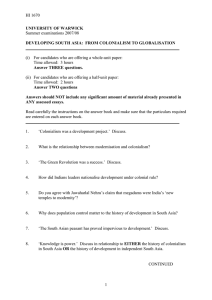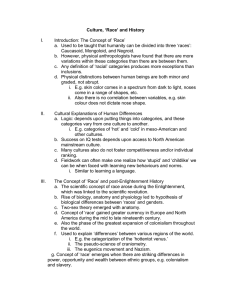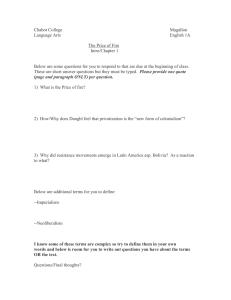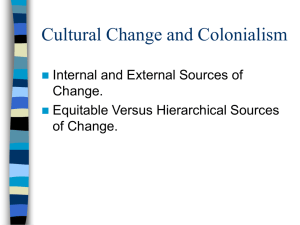Anthropology 104 Final Exam Notes: Colonialism & Health
advertisement
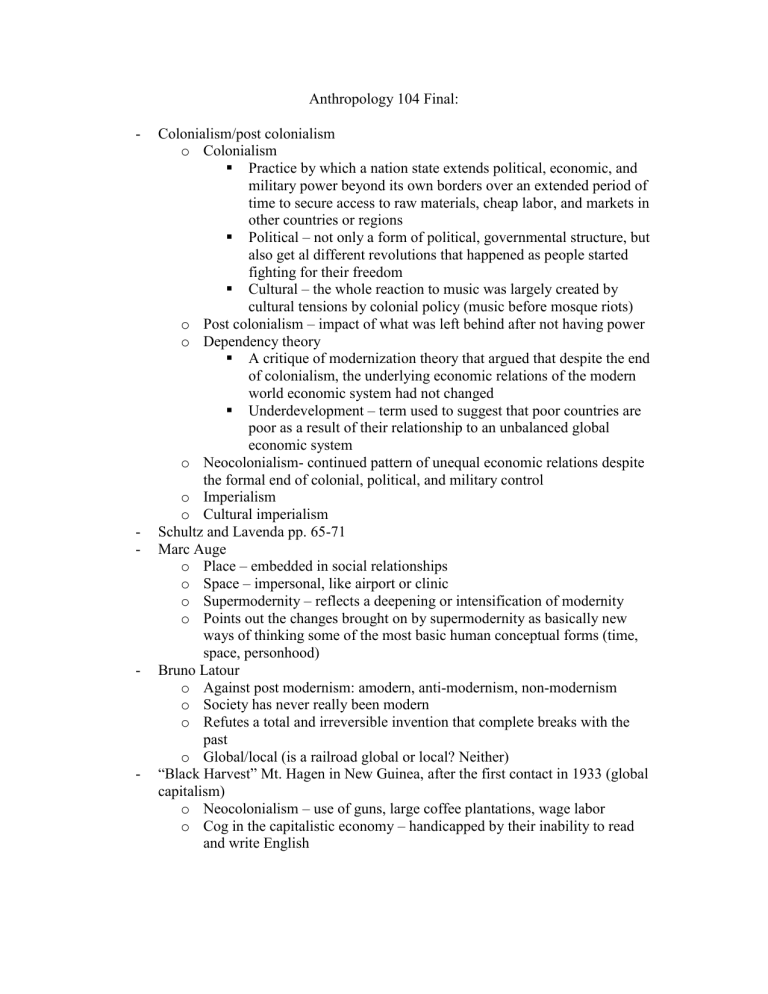
Anthropology 104 Final: - - - - Colonialism/post colonialism o Colonialism Practice by which a nation state extends political, economic, and military power beyond its own borders over an extended period of time to secure access to raw materials, cheap labor, and markets in other countries or regions Political – not only a form of political, governmental structure, but also get al different revolutions that happened as people started fighting for their freedom Cultural – the whole reaction to music was largely created by cultural tensions by colonial policy (music before mosque riots) o Post colonialism – impact of what was left behind after not having power o Dependency theory A critique of modernization theory that argued that despite the end of colonialism, the underlying economic relations of the modern world economic system had not changed Underdevelopment – term used to suggest that poor countries are poor as a result of their relationship to an unbalanced global economic system o Neocolonialism- continued pattern of unequal economic relations despite the formal end of colonial, political, and military control o Imperialism o Cultural imperialism Schultz and Lavenda pp. 65-71 Marc Auge o Place – embedded in social relationships o Space – impersonal, like airport or clinic o Supermodernity – reflects a deepening or intensification of modernity o Points out the changes brought on by supermodernity as basically new ways of thinking some of the most basic human conceptual forms (time, space, personhood) Bruno Latour o Against post modernism: amodern, anti-modernism, non-modernism o Society has never really been modern o Refutes a total and irreversible invention that complete breaks with the past o Global/local (is a railroad global or local? Neither) “Black Harvest” Mt. Hagen in New Guinea, after the first contact in 1933 (global capitalism) o Neocolonialism – use of guns, large coffee plantations, wage labor o Cog in the capitalistic economy – handicapped by their inability to read and write English - - - - o Story of the Gaiga in New Guinea, a mixed blood Joe Leahy could not inherit tribal lands, exploited the Gainga by using their cheap labor on coffee plantations Ecology/Economics/ Gifts and Commodities P. Descola: Introduction, The Ecology of Others o NATURE not as a universal category but as people in a different society understand it o Argues against the commonly held assumption that culture – a collective human making – is essentially different from the collective of non-human world, consisting of plants, animals, geology and natural forces o Instead, he has consistently upheld not only the continuity between these two concepts but harmony between the two M. Sahlins: Culture and Practical Reason Ongka’s Big Moka, Ongka, a New Guinea “Big Man” and Moka exchange M. Sahlins: Stone Age Economics o Three models of exchange Generalized reciprocity (smaller settlement/ hunter & gatherer) Expectation of a direct material return is unseemly, indefinite Balanced reciprocity (in the middle) Direct exchange of objects of equivalent value without delay Negative reciprocity (capitalistic) Unsocial extreme, get something for nothing, common in capitalistic exchanges According to Sahlins, the scial distance gets shorter in descending order Human communication and its opacity Schultz and Lavenda pg 128 Stratification: caste, class, race, gender, age, minorities o Ethnicity vs. race Race Phenotype, assumptions, social construct, identity, category, social class, biological Acquired Ethnicity Ascribed (born into it) Culture, identity, category, phenotype, language, religion, not acquired, mentorship, shared history Hibabestu Burakumin In Japan and their monkey performance Monkey performances Indentites – individual and collective Halving of the bones Anthropology of health, illness, and health care o Disease – single factor orientation, pathogen specific Western biomedical system, fancy and developing - o Illness – an understanding of “their” system/thoughts of health and departures from “health” Cultural disease o The form and meaning given to the deviations from physical wellbeing by members of the community – often embedded in world view (Ainu boils and headaches) o Health care In most societies of the world, multiple systems of health care Ethnomedicine – an understanding of “their” system/thoughts of health and departures from it The are of losing: on writing, dying, and mom My very own illness o Different culture – hypochondriacs o Doctors won’t inform patients of cancer presence o Issue with cancer in japan Considered taboo, not able to understand or deal with it Radiation from bombs – high cancer rates o Emphasis on the abdomen
